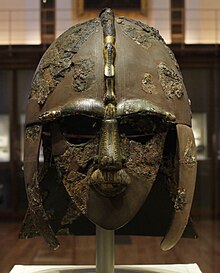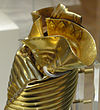Our Top Ten Treasures
| Our Top Ten Treasures | |
|---|---|
 | |
| Genre | Documentary |
| Directed by | Patricia Wheatley |
| Presented by | Adam Hart-Davis |
| Country of origin | United Kingdom |
| Original language | English |
| Production | |
| Executive producers | |
| Producer | Patricia Wheatley |
| Original release | |
| Network | BBC Two |
| Release | 1 January 2003 |
Our Top Ten Treasures was a 2003 special episode of the BBC Television series Meet the Ancestors which profiled the ten most important treasures unearthed in Britain, as voted for by a panel of experts from the British Museum.
Production
The programme was commissioned for broadcast on New Year's Day 2003 to tie in with an exhibition at the British Museum as part of new director Neil MacGregor's attempts to popularise the museum.[1]
Following the broadcast viewers were invited to vote for their favourites in a poll that was won by the Vindolanda Tablets, with the Sutton Hoo ship burial in second place.[2][3]
Reception
Richard Morrison writing in The Times criticised the British Museum for co-operating in an, "unashamedly populist television archaeology venture,"[1] and another article in the same title stated, "You may not like the idea of a league table of treasures that pits one priceless object against another, but television has its own logic."[4]
Synopsis
Every year thousands of precious things are dug up in Britain and many of them find their way here to the British Museum in London, together they represent an amazing amount of history. We've asked the museum to look out their top exhibits, both single objects and whole hoards, and we're going to go behind the scenes down into the treasure room to have a look at the top ten treasures of Britain.
— Adam Hart-Davis's introduction
Hart-Davis presents the top ten treasures as voted by the expert panel in reverse order.
| Image | Number | Object | Date | Finder | When found | Where found |
|---|---|---|---|---|---|---|
 |
10 | The Bronze Age Ringlemere Gold Cup | Bronze Age | metal-detectorist Cliff Bradshaw | 2001 | near Dover |
 |
9 | Cuerdale Silver Hoard | 10th century | stoneworkers | 1840 | banks of the River Ribble |
 |
8 | Fishpool Hoard | 15th century | workmen | 1966 | Ravenshead, Nottinghamshire |
 |
7 | Mildenhall Roman Dinner Service | Roman | Gordon Butcher, a ploughman | 1942 | near Mildenhall, Suffolk |
 |
6 | Mold cape | Bronze Age | stoneworkers | 1833 | Mold, Flintshire, Wales |
 |
5 | Lewis chessmen | 12th century | Malcolm Macleod, small tenant of Pennydonald, Uig | 1831 | Uig, Isle of Lewis in 1831 but originating in Scandinavia |
 |
4 | Snettisham Hoard | Celtic Iron Age | 1948 onwards | outside King's Lynn, Norfolk | |
 |
3 | Hoxne Hoard | Roman | metal-detectorist Eric Lawes | 1992 | near Eye, Suffolk |
 |
2 | Sutton Hoo ship burial | Early Anglo-Saxon, 7th century | Basil Brown and Edith Pretty | 1940 | Woodbridge, Suffolk |
 |
1 | Vindolanda tablets | Roman | Robin Birley | 1973 | near Hadrians Wall |
Contributors
|
|
See also
References
- ^ a b Morrison, Richard (6 July 2003). "Saint goes marching on". The Times. Retrieved 16 July 2008.[dead link]
- ^ Naish, John (28 December 2002). "This is treasure talking". The Times. Archived from the original on 16 June 2011. Retrieved 16 July 2008.
- ^ Beard, Mary (4 October 2006). "How people lived in Roman Britain". TLS. Archived from the original on 16 June 2011. Retrieved 16 July 2008.
- ^ "Play choice: Wednesday January 1". The Times. 28 December 2002. Archived from the original on 16 June 2011. Retrieved 16 July 2008.
